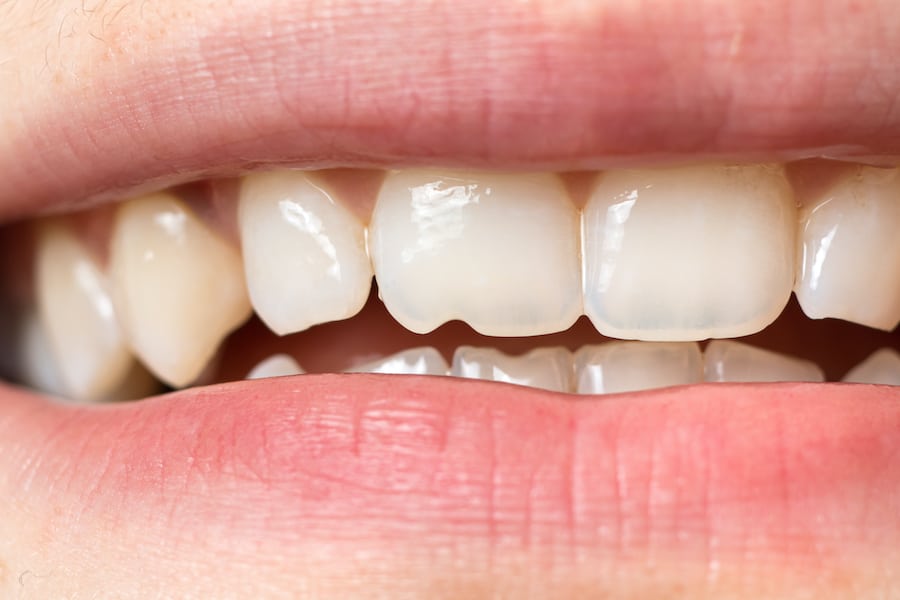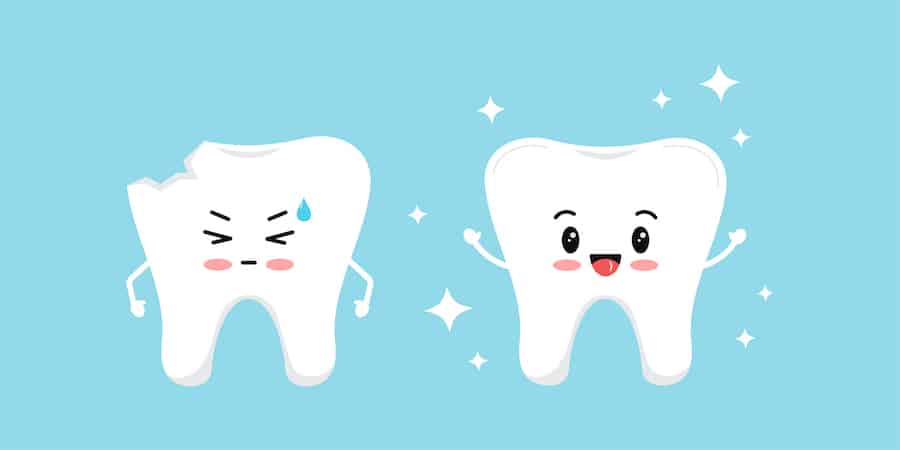If your teeth are chipping frequently, this is an important problem to address as soon as possible. It’s helpful to know what can cause frequent teeth chipping, so you can narrow down the possible causes in your case. Let’s take a look at the causes of teeth chipping, and what you can do to protect your teeth.
The Severity of Teeth Damage
If you’ve noticed small pieces of your teeth breaking off around the edges, and this has happened more than once in the span of a few months, you may be wondering what is weakening your teeth. Generally, if your teeth are frequently cracking, you’ll notice other types of damage to your teeth as well. You might also notice cracks in your teeth, from visible, noticeable cracks or small, light cracks in your tooth enamel, also called craze lines. Or, you might notice more tooth decay or discoloration.
The severity of the damage to your teeth can help you and your dentist determine what is causing frequent tooth chipping. Look for the following:
- Chips: Note if the chips are occurring more frequently on your front teeth, back teeth, or both.
- Cracks: Cracks to teeth might be light and barely noticeable, or dark and severe. Note where these cracks occur, and how severe they are.
- Tooth decay: You may notice yellow, gray, brown, or black discoloration around your teeth, showing tooth decay. Or, your dentist may tell you that you have cavities, or signs of cavities.
- Tooth sensitivity: Sensitivity to temperature extremes, sugar, or even contact can indicate that your teeth are weakened. Take note of which teeth are sensitive.
- Gum discoloration: Dark spots, redness, blisters, bleeding, or other problems with your gums can be a sign of an infection or other dental issues.
Causes of Teeth Chipping
As previously mentioned, there are many different things that can cause your teeth to chip or crack. Noting the severity of the damage to your teeth can help you assess what might be causing the problem. This can help you avoid the problems, if possible, or take the right steps to a solution.
Hard Objects
Chipping can occur when teeth are subjected to the force of biting on hard objects like ice, popcorn kernels, or non-food items, like packaging. Over time, the stress from biting or chewing these tough objects can weaken the tooth enamel, leading to small chips or fractures.
If you’ve noticed small chips only on some teeth, but you haven’t noticed other types of tooth decay or damage, chewing or biting hard objects may be the cause of your frequent tooth chipping.
Injuries
Traumatic injuries, such as a fall or a direct blow to the face, can result in chipped teeth. The impact from accidents or sports-related injuries may cause immediate damage to the enamel or dentin. Wearing protective gear during sports and taking precautions to avoid falls can help reduce the risk of injury-related tooth chipping.
If you’ve recently experienced an injury or accident, your teeth may have been weakened, and you may notice teeth chipping shortly after. Again, if you don’t notice abnormal tooth decay or other types of damage, the injury may have caused the tooth chipping.
Aging
As teeth age, they may become more susceptible to chipping due to years of wear and tear. The natural aging process can lead to enamel thinning, making the teeth more vulnerable to fractures. Maintaining regular dental check-ups and adopting preventive measures become increasingly important to preserve tooth strength and integrity as individuals age.
As you age, activities that previously didn’t damage your teeth might now cause damage. Again note where and how the damage is occurring, as this can help to eliminate other possible causes.
Tooth Decay
Cavities weaken tooth structure, creating areas of vulnerability that can lead to chipping. Decay compromises the integrity of the enamel, making it easier for the tooth to chip when exposed to the pressures of biting and chewing. Regular dental examinations and good oral hygiene practices are crucial in preventing decay-related chipping.
If your dental hygiene routine has recently changed, or you frequently suffer from cavities, tooth decay may be responsible for the frequent tooth chipping.
Fillings
While dental fillings restore and strengthen teeth affected by cavities, they can also influence the tooth’s overall structure. Over time, large or aging fillings may weaken the surrounding tooth enamel, increasing the risk of chipping.
Monitoring the condition of fillings and addressing any signs of wear can help prevent chipping. If you notice the teeth that have chipped have large fillings, and other teeth are undamaged, this might be the cause.
Acid
Frequent exposure to acidic substances, such as citrus fruits, sodas, or stomach acid, can weaken the protective outer layer of your teeth, making them more susceptible to chipping. If you are consuming acidic foods multiple times a day, consider reducing your intake. Other conditions or situations which can expose teeth to stomach acid, such as acid reflux disease, bulimia, alcoholism, or even bariatric surgery, can also damage your teeth.
If you are consuming a lot of acidic foods, or your teeth are exposed to stomach acid, this might be weakening your teeth and causing them to chip.
Nutritional Deficiency
Your teeth, like your bones and other parts of your body, need adequate nutrition to stay healthy. Inadequate intake of essential nutrients, particularly calcium and vitamin D, can compromise overall dental health. These nutrients play a vital role in maintaining strong teeth. A well-balanced diet and, if necessary, supplementation can help address nutritional deficiencies that may contribute to tooth chipping.
If you’ve recently changed your diet significantly, notably decreased your food intake, changed your vitamin regiment, or made similar changes, a nutritional deficiency may be the cause, or one of the contributing factors, to your frequent tooth chipping.
Chemotherapy
Certain medical treatments, like chemotherapy, can have side effects on oral health. Though chemotherapy is intended to destroy cancer cells, it can also affect the integrity of healthy cells, including those that support your teeth. It can also affect white blood cells, which help to fight off bacteria and infection. Overall, this can increase the risk of chipping and tooth decay.
Patients undergoing chemotherapy should work closely with their dental and healthcare teams to address potential dental issues and adopt preventive measures. If you are undergoing chemotherapy or similar treatments, and you notice damage to your teeth, this may be the cause.
Teeth Grinding
Bruxism, or teeth grinding, subjects teeth to excessive pressure, which can lead to chipping over time. The repetitive grinding motion wears down enamel and can result in uneven surfaces and edges.
Teeth grinding is often caused by stress. Therapy or changes to your stressful routine can help to reduce teeth grinding. Wearing a nightguard can also help manage teeth grinding and reduce the risk of chipping.
There are many different causes of teeth chipping. If your tooth chips a single time, it’s probably from an injury, hard object or large filling. However, if you notice numerous chips to your teeth, there may be another cause, such as exposure to acidic foods or stomach acid, illness, tooth decay, or something else. If your tooth has chipped, make an appointment with a dentist right away to help prevent further damage to your tooth or other teeth.


